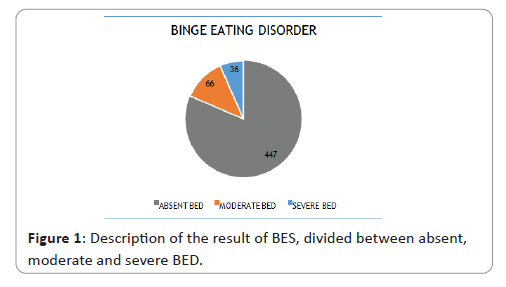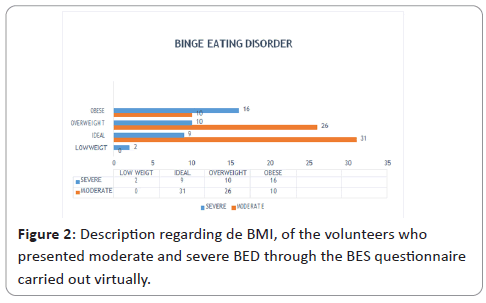Periodic Binge Eating Disorder during the Social Isolation Due to Covid-19 Pandemics
Talie Hanada*, Rahissa Cestari, Luiz Eduardo Miguel, Bianca Miguel, Marcelo Casati and Rodrigo Pereira
DOI10.36648/2471-8203.6.4.59
Talie Hanada*, Rahissa Cestari, Luiz Eduardo Miguel, Bianca Miguel, Marcelo Casati and Rodrigo Pereira
Department of Neurology, Universidade Metropolitana de Santos, Santos, SP, Brazil
- *Corresponding Author:
- Hanada T
Department of Neurology, Universidade Metropolitana de Santos, Santos, SP,Brazil
Tel: 55(11) 971021940
E-mail: Talie.hanada@hotmail.com
Received Date: September 09, 2020; Accepted Date: September 23, 2020; Published Date: September 30, 2020
Citation: Hanada T, Cestari R, Miguel LE, Miguel B, Casati M, et al. (2020) Periodic Binge Eating Disorder during the Social Isolation Due to Covid-19 Pandemic. J Obes Eat Disord Vol.6 No. 4:15.
Abstract
Aim: Eating behavior characterized by eating a large amount of food in a limited period of time (up to two hours), accompanied by a feeling of loss of control over what or how much is eaten, is known as Binge Eating Disorder (BED). In December 2019, in the Chinese province of Wuhan, a new type of coronavirus was identified in patients, characterized by atypical pneumonia consisting of fever, dry cough and progressive dyspnea. This coronavirus, SARS-CoV-2, has spread rapidly around the world, leading to a high-impact pandemic worldwide. With this, social isolation was implemented as a way to contain the transmission of the disease.
Objective: To assess binge eating during the social isolation due to COVID-19 pandemic.
Methodology: This is an analytical cross-sectional study with healthy individuals, without previous diagnosis of Binge Eating Disorder, of both sexes, who are fulfilling social isolation during the COVID-19 pandemic, reporting that they are working or studying within their houses. To collect data on binge eating episodes, the BESBinge Eating Scale, which is a widely used instrument, was used and developed to assess the severity of Periodic Binge Eating (BED) in obese individuals. It provides the result in three categories: severe BED (score>27), moderate BED (score between 18 and 26) and absence of BED (score<17). It is not a diagnostic tool, but a method of assessing the severity of impaired eating behavior. The questionnaire was previously approved by the Ethics and Research Committee and was made available for a period of one month, during the pandemic by COVID-19, where social isolation was considered a measure of recommendation by the Ministry of Health in Brazil. In addition, data such as gender, age, weight and height were also extracted from the volunteers. 500 volunteers participated in the study, aged between 18 and 50 years old, 70 men and 430 women.
Results: From the BES questionnaire, the results showed that 22.8% of the volunteers were classified with BED, 64.7% being moderate and 35.3% severe.
Conclusion: The results showed that social isolation can have an important impact on compulsive eating disorders.
Keywords
Binge Eating Disorder; COVID-19; Social isolation
Introduction
Binge Eating Disorder (BED) is identified as the episodic increase in food intake. This can be related to emotions, frustration and guilt. A key point of Binge Eating Disorder is the feeling of loss of control, for at least two hours, for at least two days a week over a period of six months [1,2]. Often the compulsion it is associated with low levels of energy and mood and social isolation can be an aggravating factor for these disorders of disordered eating behaviors [3,4]. In December 2019, a new type of coronavirus was identified, characterized by a condition of atypical pneumonia composed of fever, dry cough and progressive dyspnea [5]. This coronavirus, SARS-CoV-2, quickly spread around the world, leading to a high impact pandemic worldwide. In January 2020, the World Health Organization (WHO), declared the new coronavirus as a public health emergency of international concern and as a safety measure, governments implemented measures to contain the disease, such as school closures, social distance and quarantine in their homes [6,7]. Isolation is the total detachment of a person already diagnosed, so that there is no transmission within the family nucleus [8]. However, social detachment can be associated with poor mental health, stress symptoms, anger and avoidance behaviors [9]. The purpose of this review was to establish what is known about the impact of social isolation on binge eating [10].
Materials and Methods
This is an analytical cross-sectional study with healthy individuals, without previous diagnosis of Binge Eating Disorder, of both sexes, who are fulfilling social isolation during the COVID-19 pandemic, reporting that they are working or studying within House. To collect data on binge eating episodes, the BES-Binge Eating Scale, translated version of the Binge Eating Scale-BES, was used which is a widely used instrument, and was developed to assess the severity of Periodic Binge Eating (BED) in obese individuals. It is a Likert scale, composed of 16 items that assess behavioral manifestations and the feelings and cognitions involved in an episode of BES. It provides the result in three categories: severe BED (score>27), moderate BED (score between 18 and 26) and absence of BED (score<17). It is not a diagnostic tool, but a method of assessing the severity of impaired eating behavior. The questionnaire was previously approved by the Ethics and Research Committee and was made available for a period of one month, during the pandemic by COVID-19, where social isolation was considered a measure of recommendation by the Ministry of Health in Brazil. In addition, data such as gender, age, weight and height were also extracted from the volunteers. 500 volunteers participated in the study, aged between 18 and 50 years old, 70 men and 430 women. The inclusion criteria for conducting the questionnaire were restricted to individuals without previous diagnosis of Binge Eating Disorder and who were in social isolation, carrying out educational or professional activities in their respective homes. Before starting the questionnaire, each volunteer agreed to be aware of the consent form and should answer whether they were complying with social isolation, otherwise they would be redirected to the end of the questionnaire as they are not included in the research inclusion criteria.
Results
Of the 500 volunteers, 53 did not fit the social isolation requirements, thus 447 volunteers participated in the study, the majority of who were female in 86.5% while the male was 13.5%, with an age range between 18 to 60 years. All participants stated that they did not have a previously diagnosed compulsive eating disorder. Of the total number of adults evaluated, 22.8% fit the diagnosis compatible with moderate to severe BED, according to BES. 64.7% (66 volunteers) with moderate BES and 35.3% with severe BED (36 volunteers), as seen in Figure 1.
In addition, a significant association was detected with the Body Mass Index (BMI) as seen in Figure 2, where of the 102 volunteers with altered BED, 36 individuals are overweight, and 26 are obese, demonstrating a great impact regarding the tendency to compulsion, when associated with a period of isolation, such as the pandemic against Covid-19.
Discussion
The current results showed that, there was a moderately high rate of individuals that fit the classification, moderate to severe, of binge eating by BES performed virtually, in the period of social isolation, in the face of the Coronavirus pandemic. Given that social isolation can be associated with a reduced capacity for self-regulation, it can be an important moderating mechanism of the associations between negative affect, restriction and binge eating. People with eating disorders have a complex relationship with food, which may be exacerbated during the SARS-COV-2 isolation period [11]. Factors such as, fear of becoming infected or infecting another, change of routine and lack of information about pathology are factors with a high potential stressor that can negatively impact compensatory habits From the results analyzed, it can be inferred that, among the individuals with altered results in BES, there was a significant number of patients with overweight or obesity, which is confirmed to be a common comorbidity in patients with BED [10,12-15].
Conclusion
In addition, the results of this study show that, being female, being fifteen years old or older and having a high body mass index were the variables that had the highest frequency in cases of BES alteration. Our results corroborate the hypothesis that, social isolation can be a risk factor to mediate compensatory acts with food. Although this is a cross-sectional study, future research must examine these relationships longitudinally so that we can have new studies that support this theory.
References
- Kannan S, Shaik Syed Ali P, Sheeza A, Hemalatha K (2020) COVID-19 (Novel Coronavirus 2019) : Recent trends. Eur Rev Med Pharmacol Sci 24:2006-2011.
- Araujo DMR, Santos GF Da S, Nardi AE (2010) Binge eating disorder and depression: A systematic review. World J Biol Psychiatry 11:199–207.
- Dingemans A, Danner U, Parks M (2017) Emotion regulation in binge eating disorder: A Review. Nutrients 9:1274.
- Ray J (2012) Implicit and explicit social isolation in eating disordered individuals (Master's thesis). Retrieved From Proquest Dissertation and Theses.
- Abdurrahman T, Aslıhan avanoğlu G, Marco M (2020) COVID-19, immune system response, hyperinflammation and repurposing antirheumatic drugs. Tur J Med Sci 50:620-632.
- Adnan Shereen M, Khan S, Kazmi A, Bashir N, Siddique R (2020) COVID-19 infection: Origin, transmission, and characteristics of human coronaviruses. J Adv Res 24:2090-1232.
- Rahmet G, İmran H, Firdevs A (2020) COVID-19: Prevention and control measures in community. Turk J Med Sci 50:571-577.
- Elizabeth Loades M, Chatburn E, Higson Sweeney N, Reynolds S, Shafran R, et al. (2020) Rapid Systematic Review: the impact of social isolation and loneliness on the mental health of children and adolescents in the context of covid-19. J Am Acad Child Adolesc Psychiatry 50:2-6.
- Wilder smith A, Freedman DO (2020) Isolation, quarantine, social distancing and community containment: Pivotal role for old-style public health measures in the novel coronavirus (2019-ncov) outbreak. J Travel Med 13:taaa020.
- Brooks Samantha K, Webster Rebecca K, Smith Louise E, Woodland L, Wessely Simon, et al. The psychological impact of quarantine and how to reduce it: Rapid review of the evidence. The Lancet 395:912-920.
- Mason Tyler B, Heron Kristin E, Braitman Abby L, Lewis Robin J (2016) A daily diary study of perceived social isolation, dietary restraint, and negative affect in binge eating. Appetite 97:94-100.
- Touyz S, Lacey H, Hay P.(2020) Eating disorders in the time of COVID-19. J Eat Disord 8:19.
- Pivetta LA, Gonçalves Silva RMV (2010) Compulsão alimentar e fatores associados em adolescentes de Cuiabá, Mato Grosso, Brasil. Cadernos de Saúde Pública 26:337-346.
- Braunack Mayer A, Tooher R, Collins JE, Street JM, Marshall H (2013) Understanding the school community's response to school closures during the H1N1 2009 Influenza pandemic. BMC Public Health 13:344.
- ANJOS, Luiz A (1992) Índice de massa corporal (massa corporal.estatura-2) como indicador do estado nutricional de adultos: revisão da literatura. Revista de Saúde Pública 26:431-436.
Open Access Journals
- Aquaculture & Veterinary Science
- Chemistry & Chemical Sciences
- Clinical Sciences
- Engineering
- General Science
- Genetics & Molecular Biology
- Health Care & Nursing
- Immunology & Microbiology
- Materials Science
- Mathematics & Physics
- Medical Sciences
- Neurology & Psychiatry
- Oncology & Cancer Science
- Pharmaceutical Sciences


